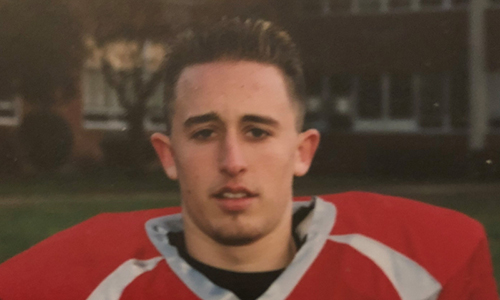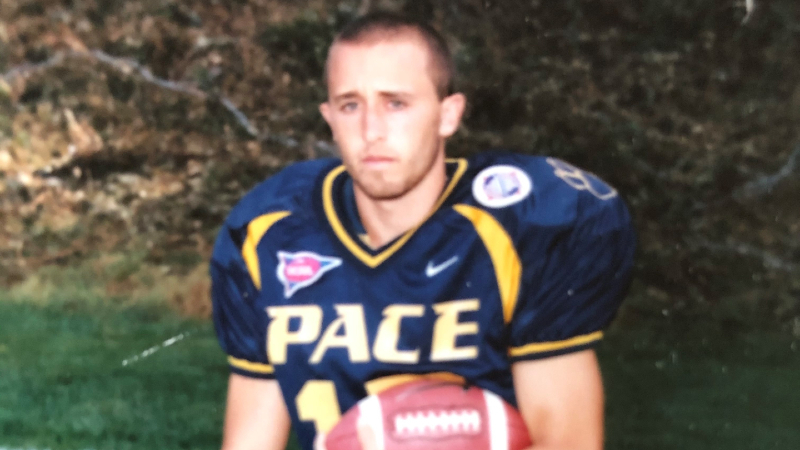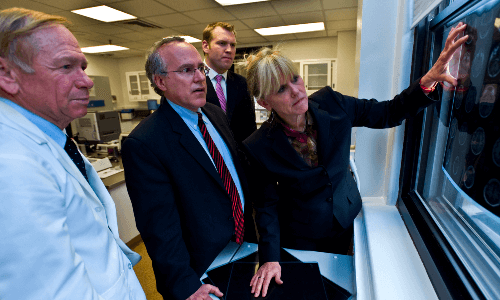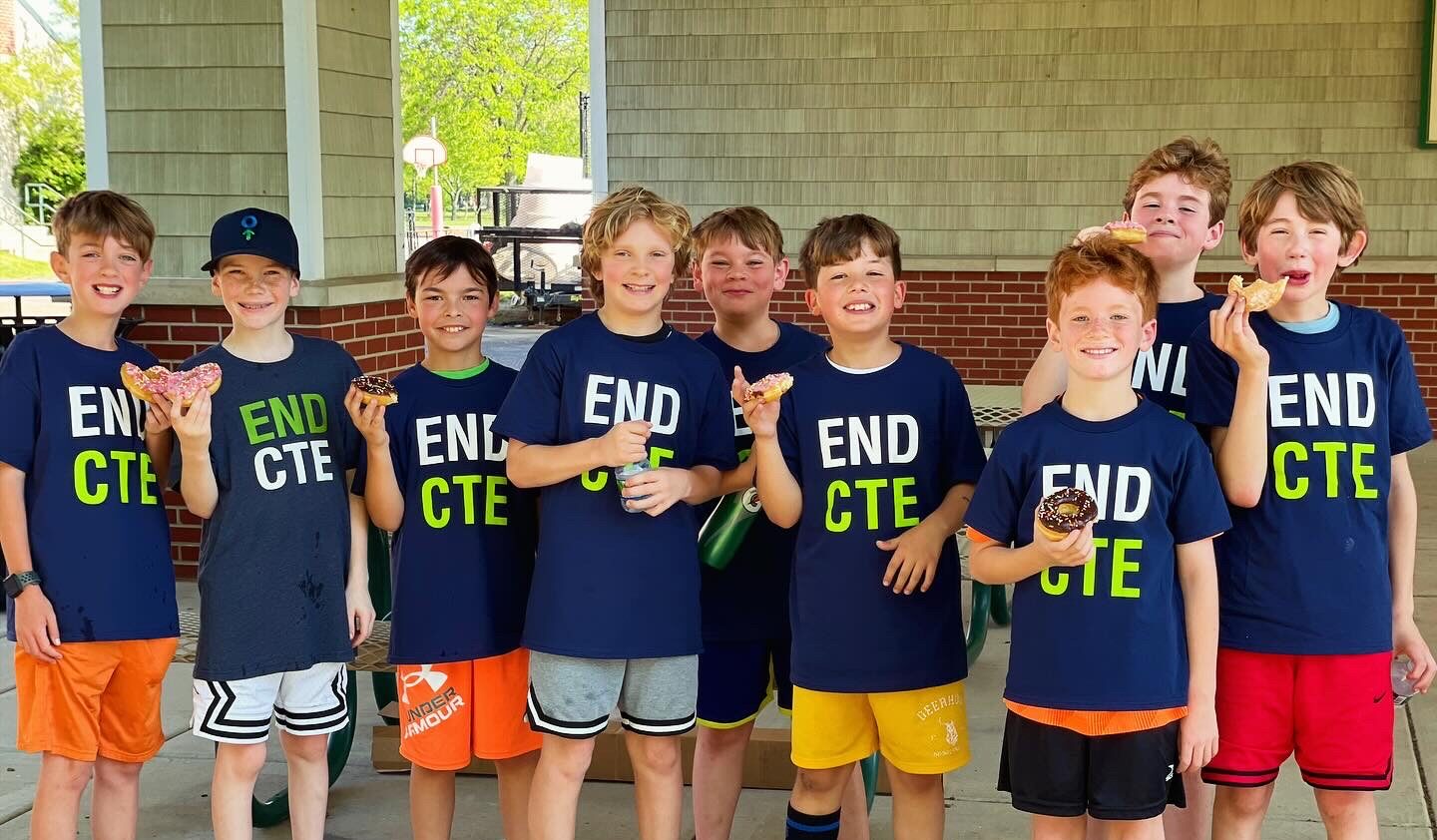Fair Lawn, New Jersey, native Luke Frey’s fifth concussion ended his college football career before he could finish his freshman season at Pace University. In his 20s, Frey slowly became more depressed, angry, and withdrawn and he battled short-term memory issues. He started to self-medicate and struggled with drug addiction before getting clean. Frey suspected his concussion history was affecting him and that he suffered from Chronic Traumatic Encephalopathy (CTE). He passed away on January 3, 2019, at age 31 from a stroke and his family fulfilled his wish to donate his brain to the UNITE Brain Bank. Researchers there diagnosed him with Stage 1 (of 4) CTE. Now, his sisters are sharing his story to help families support a loved one affected by concussions and to give back to football through research.

As a child, Luke loved anything that was blue, and it just so happened his favorite animal was a lion. One Sunday while watching football with the family he discovered the Detroit Lions and became enamored with Barry Sanders and the game of football. He spent the rest of his life dedicated to the game, and he told everyone he “bled Honolulu Blue.”
Luke was a great all-around athlete from a young age, playing baseball, soccer, basketball, ice and street hockey, running track, and of course football. He played wide receiver, tight end, safety, and wherever else the coaches needed him. Later in his career, he focused on kicking. He was a four-year Varsity player for the Fair Lawn High School Cutters, and he went on to join the team at Pace University, where his football career ended.
During his life Luke suffered numerous injuries, and a majority of them were to his head. He was eight years old when he suffered his first concussion while rollerblading. The next two happened during junior football, the second of which involved him being taken off the field in an ambulance. Two more concussions came in high school, the first by sliding in a high school baseball game and another from a hard hit during a football game. His final concussion took place in college and ended his playing career for good. When he lost football, he started to lose himself.
This could not have come at a worse time. The loss of football was followed by the loss of our father, a man of many hats. Among his roles were the Superintendent of Parks and Recreation, a Board of Education member, basketball and baseball coach, and his favorite role: dad. Our dad always found ways to give back to the community and his family. Losing a parent is hard enough, but when you lose someone who believes in all the potential you have in this world and who you idolize more than anything, you succumb to the negatives in life. Luke sunk into a depression, left school, and dealt with frequent headaches and the frustrations from short-term memory loss.
After losing himself and the opportunity to play the sport he loved so much, Luke turned to coaching. He volunteered to coach a Pee Wee football team in his hometown’s football association. This brought a light to Luke’s eyes we hadn’t seen since he had to give up playing the game himself. Luke chose to coach because he knew if he could not play, the next best thing would be to educate the younger generations about a game that meant so much to him. Not only did Luke coach these kids, they would reach out to him during the offseason just so they could get a workout in or spend time with him at the fields. When Luke stopped being involved in the town’s football association, he began to lose himself a bit more.
Luke was always the happy-go-lucky, funny, charming, class clown with a heart of gold. He was liked by everyone and would give you his last dollar. He was full of love and laughter and brought joy to those around him. He was both a brother and best friend to his three sisters and did everything with his family.
But over time, he became more depressed and angry. He had difficulties comprehending what he was reading and would have to reread a paragraph multiple times. He would have to rewind the same scene on the TV over and over until he could move on to the next. He could go from being calm to punching a wall within seconds when something suddenly set him off.
This led him down a dark path in which he chose to self-medicate to ease his headaches, help him sleep, and stop the voices he was hearing that told him he was worthless. Self-medicating led him to harder drug use and eventually he started sleeping all day, couldn’t hold a job, and broke relationships with those closest to him. He finally hit rock bottom and went to rehab. He cleaned himself up for a few years and then relapsed before going back and getting sober.
Luke then met his amazing fiancé Emily and became a dad to Meadow. Meadow became his reason for living and he was his happiest being a dad, even if it was for a short time.

Even when he was happy, Luke told us all that there was something wrong with him. Always a football fan and reading every article and watching any documentary that pertained to the sport, he learned about CTE and researched it further. He felt he had some of the symptoms and was frightened for his future. He always made it known to his family that he knew he was not long for this life and that if something should happen to him, he wanted to donate his brain tissue for CTE research. He wanted to be a part of the research, to help find a way to show its effects, to help prevent it, to help find treatments, and most importantly to help those who love sports be able to play them safely.
During his final days, our family discussed his wishes and called Boston University to see what steps needed to be taken before we lost him. I like to believe that donating to the UNITE Brain Bank was Luke’s last wish and it was my job to help him achieve it. On January 3, 2019, Luke passed away of a stroke. He was 31 years old.
Thirteen months after his death, we learned Luke was diagnosed with Stage 1 (of 4) CTE. While there are still many questions and possibilities about whether or not his diagnosis helped contribute to his mental health issues, his drug use and his death, it is reassuring to know there was something that may have changed him from the boy we knew. I felt a huge relief and closure for Luke, knowing that he was right, that he knew his body and knew this could be why he chose to donate, and that he wanted his legacy to be one that could help bring awareness to young athletes like himself.
We hope if anyone takes anything out of Luke’s story it’s to know how much he loved his friends, football, and his family with everything he had. We also want others to not give up on loved ones who’ve suffered from concussions and head trauma. They are invisible injuries with effects that are hard to quantify. We do not know what they are going through mentally, how they’re thinking, how they’re feeling, or what type of pain they are suffering from. We need to stop pushing them to get back to their sports before they are healed enough to do so. Concussions aren’t to be taken lightly. What should matter is the health of each athlete.
-Written by Katie Frey (sister) on behalf of Joan Frey (mother), Maggie Quinn (sister), Kasey Frey (sister), Emily Costello (fiancé) and Meadow Frey (daughter)
Luke also leaves behind his nephew River Frey and nieces Peyton Quinn and Reese Pinsdorf, brother in laws John Quinn and William Pinsdorf, and his Aunt and Uncle Kathleen and Peter Drozd.
He was predeceased by his father George Frey, and a local scholarship is given each year in their honor for young athletes who have dedicated their time to coaching, working, or volunteering for the community.
George and Luke Frey Memorial Scholarship
28-06 Madison Terr
Fair Lawn, NJ 07410

